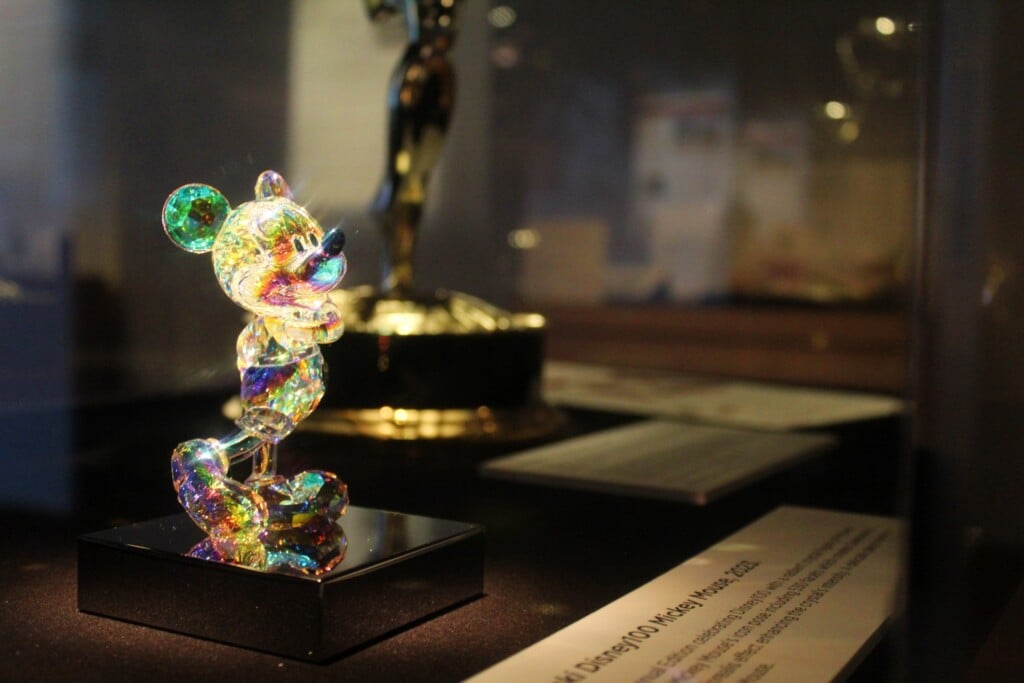Toil and Trouble
Before showtime, as purplish light bathed a stony-walled Dunsinane and its impressive drawbridge, word spread through the crowd: “The actors are going to be switching parts sometimes,” a high school girl whispered. Her friend didn’t buy it, but a nearby mother did. She stood up, seized her husband’s hand, and swept across the theater, apologizing as she passed: “My kids are way over there, and if I don’t help them, they won’t get it.”
The lights dimmed, and up came the witches, fit young women clawing and writhing with their faces scarved, sing-songing in eerie unison, howling at times but always with a shivery music. Sensuously, they knotted around Macbeth and boiled over with such sound and fury, it almost made sense that the ambitious fool would blow the next 75 minutes murdering his way through Scottish royalty. Scenes came at us like confetti launched from a cannon, sometimes in simultaneous montage: Lady Macbeth reading a letter while, downstage, her husband stick-fights some army; for most of this production, the witches bubbled up from their pit or heaved themselves back into it, sometimes tumbling and sometimes pawing about like Gollum might have if he’d been a stripper.
This is Macbeth at the Coterie. Actually, they’re calling it In Spite of Thunder: The Macbeth Project, which must be intended as a warning. By design, it’s just the brilliant and nasty bits, all hellbrew and hurly-burly. It offers all the -cides (regi-, sui-, infanti-), half the chatter and maybe — being generous here — a third of the coherence. (If that mom and her kids hadn’t read the play, they were SOL.) In the Freaky Friday world of Kansas City theater, the Rep is warming hearts with a beloved young-adult novel while the so-called children’s theater is risking headaches with unconventional Shakespeare.
Each summer at the Shakespeare festival in Southmoreland Park, director Sidonie Garrett demonstrates to thousands her knack for pageantry on a budget. Here, in a show that’s all flourish, she exults in it, arranging her actors in a series of sumptuous visions. Art Kent’s lighting makes the shadows deep and the murders lurid, and costumer Renee Garcia provides scarves and robes and sturdy royal-wear that defines the characters. Every couple of scenes, the cast stops stabbing one another long enough for one Macbeth and Lady to pass the cloak and robe to the next Macbeth and Lady. They make a little ceremony of it, like a Webelos induction. Round-robining it means the actors don’t have much time to make strong impressions, but Patrick Du Laney and the ferocious Vanessa Severo are both commanding yet human, and Jess Akin gets credit for consistent intelligibility.
Once they’ve swapped parts, the play picks back up, the witches run through their rhymes again, and another line or speech or scene you remember flits by, exciting but far too fast to savor. Then come another and another, and then something baffling, and then that forest is marching and MacDuff boasts that he “from his mother’s womb was untimely ripped,” and then it’s all over, vague but dazzling, leaving you feeling like it might be cool to see Macbeth sometime.
While the Coterie’s troupers grapple with material too grand for almost anyone to master, the comely young things in Just Off Broadway’s schticky musical I Love You, You’re Perfect, Now Change are managing a kinda-sorta triumph over a script they outclass. Bradley J. Thomas, Danielle Gibbs, Shea Coffman and Andrea Boswell-Burns coax humor and pathos from scenes that, as written, boast little of either.
The show is one of those revues packed with songs and sketches on a single theme — in this case, dating and marriage. Typically, instead of hunting down fresh jokes on the subject, the writers have gone about things whale-style: floating in conventional waters, opening their mouths and letting the gags drift in like plankton. A lawyer promises financial compensation for unsatisfied lovers; halfway through the second act, a song called “Waiting” presents a wife waiting out the endless final seconds of a football game, a man waiting for his mate to finish shoe-shopping and a woman waiting in line to use a restroom. I was waiting for a joke I hadn’t heard before.
Still, director Steven Eubank never floats, coasts or — these days — miscasts. His actors execute the material with crispness and charm, especially Thomas and Boswell-Burns. Thomas glides along with an easy, masculine charisma, likable even when playing bug-eyed anxiety as a man trying not to cry at a chick flick. Boswell-Burns is a mainstay of Eubank’s productions, but she has never been the force she is here, whether barnstorming through comedy numbers or shrinking in on herself as a divorcée daring herself to date again. The numbers are jaunty but predictable. Most of them climax with a spoken joke just before the razzle-dazzle final notes. The singing is strong, the choral passages stirring and the piano accompaniment (by musical director Daniel Doss) wholly satisfying. Doss and Eubank bring out the best in each other. Maybe next time, they’ll succeed with a script instead of in spite of one.




